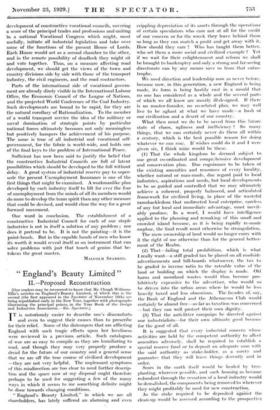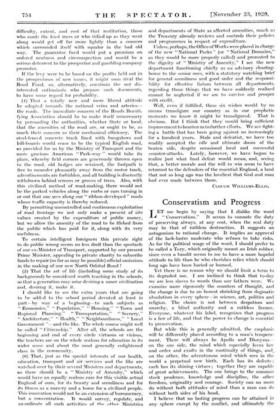" England's Beauty Limited
IL—Proposed Reconstruction
[Our readers may be interested to know that Mr. Clough Williams- Ellis's articles on England's Beauty Limited, of which this is the second (the first appeared in the Spectator of November 16th) are being republished early in the New Year, together with photographs illustrating the principal points, in the Year Book of the Design and Industries Association.—ED. Spectator.]
IT is notoriously easier to describe one's discomforts and even to suggest their causes than to prescribe for their relief. - Some of the distempers that are afflicting England with such tragic effects upon her loveliness were reviewed in a previous article. Such catalogues of woe are as easy to compile asthey are humiliating to read, and though they may very properly produce a dread for the future of our country and a general sense .that we are off the true course of civilized development —they are not very helpful. The unpleasant symptoms of this misdirection are too clear to need further descrip- tion and the space now at my disposal ought therefore perhaps to be used for suggesting a few of the many ways in which it seems to me something definite might be done towards- changing conditions.
" England's Beauty Limited," in which we are all shareholders, has lately suffered an alarming and " even crippling depreciation of its assets through the operations of certain speculators who care not at all for the credit of our concern or for the wreck they leave behind them so long as they can snatch a profit and get away with it. How should they care ? Who has taught them better, who set them a more social and civilized example ? Yet if we wait for their enlightenment and reform we shall be brought to bankruptcy and only a strong and far-seeing directorate can by any means save us from that catas- trophe.
We need direction and leadership now as never before, because now, in this generation, a new England is being made, its form is being hastily cast. in a mould that no one has considered as a whole and the several parts of which we all know are mostly ill-designed. If there is no master-founder, no co-related plan, we may well live to be aghast at what we have made—a hash of our civilization and a desert of our country.
What then must we do to be saved from this future state of chaos, ugliness and inefficiency ? So many things, that we can certainly never do them all within a century, which is the best possible reason for doing whatever we can now. If wishes could do it and I were given six, I think mine would be these.
(1) That the whole kingdom be deemed subject to one great co-ordinated and 'comprehensive development and conservation plan. Due cognizance to be taken of the existing amenities and resources of every locality, whether natural or man-made, due regard paid to local industries, aspirations and needs, but local developments to be so guided and controlled that we may ultimately achieve a coherent, properly balanced, and articulated framework for civilized living, in place of the wasteful ramshackledom that undirected local enterprise, careless of any but local and immediate advantage, must inevit- ably produce. In a word, I would have intelligence applied to the planning and remaking of this small and crowded island because, as it is being rapidly re-made anyhow, the final result must otherwise be strangulation.
The mere ownership of land would no longer carry with it the right of use otherwise than for the general better- ment of the Realm.
(2) That—failing total prohibition, which is what I really want—a stiff graded tax be placed on all roadside advertisements and bill-boards whatsoever, the tax to be graded in inverse ratio to the rateable value of the land or building on which the display is made. Old barns and moorland wastes would thus become pro- hibitively expensive to the advertiser, who would so be driven into the urban areas where he would be less heavily taxed and less obnoxious. The facades of, say, the Bank of England and the Athenaeum Club would certainly be almost free—so far as taxation was concerned —but they can well protect their own dignity.
(8) That the anti-litter campaign be directed against our industrialists—for their own ultimate good because for the good of all.
It is suggested that every industrial concern whose activities are held by the competent authority to affect amenities adversely, shall be required to establish a special reserve fund or to deposit an adequate sum with the said authority as stake-holder, as a surety and guarantee that they will leave things decently and in order.
Scars in the earth itself would be healed by tree- planting, wherever possible, and such housing as became redundant through the cessation of a local industry would be demQlished, the components being removed to wherever they might profitably be used for new construction. As the stake required to be deposited against the cleati-up would be assessed according to the prospective difficulty, extent, and Cost of that restitution, those who made the least mess or who tidied up as they went along would get off far more lightly than a concern which surrounded itself with squalor in the bad old way. The guarantee fund would put a premium on ordered neatness and circumspection and would be a serious deterrent to the prospector and gambling company promoter.
If the levy were to be based on the profits held out in the prospectuses of new issues, it might soon rival the Road Fund, or, alternatively, constrain the not dis- interested enthusiasts who prepare such documents, to have some regard for probability.
(4) That a totally new and more liberal attitude be adopted towards the national veins and arteries— the roads. The immediate concern of the Roads Beauti- fying Association should be to make itself unnecessary by persuading the authorities, whether State or local, that the amenities of the road are, or ought to be, as much their concern as their mechanical efficiency. The steel-fenced concrete track lined with bungalows and bill-boards would cease to be the typical English road, as provided for us by the Ministry of Transport and the more gracious American " Park-way " would take its place, whereby field corners are generously thrown open to the road, old hedges are retained, the footpath is free to meander pleasantly away from the motor track, advertisements are forbidden, and all building is discreetly withdrawn behind screens or groves of trees. Also, with this civilized method of road-making, there would not be the parked vehicles along the curbs or cars turning in or out that one sees along our " ribbon-developed " roads whose ti affic capacity is thereby reduced.
By permitting uncontrolled and continuous exploitation of road frontage we not only make a present of site values created by the expenditure of public money, but we allow the amenity of the road to be filched from the public which has paid for it, along with its very usefulness.
To certain intelligent foreigners this private right to do public wrong seems no less droll than the spectacle of our ex-Minister of Transport, supported by our present Prime Minister, appealing to private charity to subscribe funds to repair (so far as may be possible) official omissions in the making of our new North Orbital Road !
(5) That the art of life (including some study of its background) be considered worth teaching in the schools, so that a generation may arise desiring a saner civilization and, desiring it, make it.
I should like to see the extra years that are going to he added to the school period devoted at least in part—by way of a beginning—to such subjects as " Economics," " Population," " Housing," " Town and Regional Planning," " Transportation," " Scenery," " Architecture," " Health," " Neighbourliness," " Local Government "—and the like. The whole course might well be called " Citizenship." After all, the schools are the beginning and end of every circle virtuous or vicious, the teachers are on the whole zealous for education in its wider sense and about the most generally enlightened class in the community.
(6) That, just as the special interests of our health, education, transport and air services and the like are watched over by their several Ministers and departments, so there should be a " Ministry of Amenity," which would have an equally zealous care for this visible actual England of ours, for its beauty and seemliness and for its fitness as a nursery and a home for a civilized people. This innovation would not be an extension of bureaucracy, but a concentration. It would survey, regulate, and co-ordinate all such activities of the other Ministries and departments of State as affected amenities, much as the Treasury already reviews and controls their policies and programmes in respect of expenditure.
Unless, perhaps, the Office of Works were placed in charge of the new "National Parks" (or "National Domains," as they would be more properly called) and promoted to the dignity of " Ministry of Amenity," I see the new department functioning chiefly as an advisory clearing- house to the senior ones, with a statutory watching brief for general seemliness and good order and the responsi- bility for effective liaison between all departments, regarding those things that we have suddenly realized cannot be neglected if we are to survive and prosper with credit.
Well, even if fulfilled, these six wishes would by- no means transfigure our country as in our prophetic moments we know it might be transfigured. That is obvious. But I think that they would bring sufficient improvement to hearten us to further efforts. We are fight- ing a battle that has been going against us increasingly for a hundred years. Stale and defeatist, we have toe) readily accepted the role and ultimate doom of the beaten side, despite occasional local and successful counter-attacks. Lately, however, we have begun to realize just what final defeat would mean, and, seeing that, a better morale and the will to win seem to have returned to the defenders of the essential England, a land that not so long ago was the loveliest that God and man had ever made between them.
CLOUGH WILLIAMS-ELLIS.































































 Previous page
Previous page